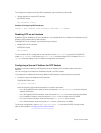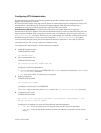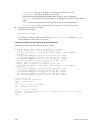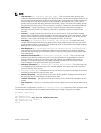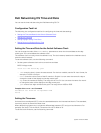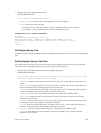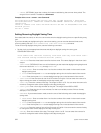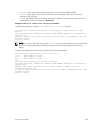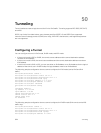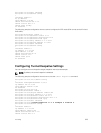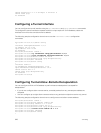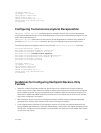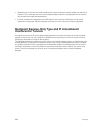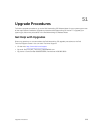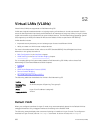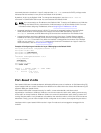
50
Tunneling
Tunnel interfaces create a logical tunnel for IPv4 or IPv6 traffic. Tunneling supports RFC 2003, RFC 2473,
and 4213.
DSCP, hop-limits, flow label values, open shortest path first (OSPF) v2, and OSPFv3 are supported.
Internet control message protocol (ICMP) error relay, PATH MTU transmission, and fragmented packets
are not supported.
Configuring a Tunnel
You can configure a tunnel in IPv6 mode, IPv6IP mode, and IPIP mode.
• If the tunnel mode is IPIP or IPv6IP, the tunnel source address and the tunnel destination address
must be an IPv4 address.
• If the tunnel mode is IPv6, the tunnel source address and the tunnel destination address must be an
IPv6 address.
• If the tunnel mode is IPv6 or IPIP, you can use either an IPv6 address or an IPv4 address for the logical
address of the tunnel, but in IPv6IP mode, the logical address must be an IPv6 address.
The following sample configuration shows a tunnel configured in IPv6 mode (carries IPv6 and IPv4
traffic).
Dell(conf)#interface tunnel 1
Dell(conf-if-tu-1)#tunnel source 30.1.1.1
Dell(conf-if-tu-1)#tunnel destination 50.1.1.1
Dell(conf-if-tu-1)#tunnel mode ipip
Dell(conf-if-tu-1)#ip address 1.1.1.1/24
Dell(conf-if-tu-1)#ipv6 address 1::1/64
Dell(conf-if-tu-1)#no shutdown
Dell(conf-if-tu-1)#show config
!
interface Tunnel 1
ip address 1.1.1.1/24
ipv6 address 1::1/64
tunnel destination 50.1.1.1
tunnel source 30.1.1.1
tunnel mode ipip
no shutdown
The following sample configuration shows a tunnel configured in IPV6IP mode (IPv4 tunnel carries IPv6
traffic only):
Dell(conf)#interface tunnel 2
Dell(conf-if-tu-2)#tunnel source 60.1.1.1
Dell(conf-if-tu-2)#tunnel destination 90.1.1.1
Dell(conf-if-tu-2)#tunnel mode ipv6ip
Dell(conf-if-tu-2)#ipv6 address 2::1/64
924
Tunneling



